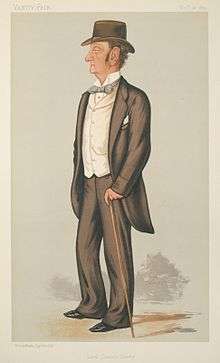Charles Robert Barry

Charles Robert Barry QC, PC (3 January 1823[1] – 15 May 1897) was an Irish lawyer who rose to become a Lord Justice of Appeal for Ireland.
Legal and judicial career
He was born in Limerick, son of James Barry, solicitor. He was educated at the University of Dublin and admitted to Lincoln's Inn.[2]
Barry was admitted to the Irish Bar in 1848 and was appointed Queen's Counsel in 1859. He was Member of Parliament for Dungarvan from 1865 to 1868, He was appointed Law Adviser to the Lord Lieutenant of Ireland in 1865, and was made Third Serjeant-at-law (Ireland) in 1866. He served as Solicitor-General for Ireland from 1868 to 1870, and as such prosecuted the Fenians in 1868. From 1870 to 1872 he was Attorney-General for Ireland.[3] In 1872 Barry was appointed a Justice of the Queen's Bench and from 1883 to 1897 served as Lord Justice of the Irish Court of Appeal.[4] Elrington Ball attributed his rise not only to his extraordinary legal ability, but also his immense personal popularity.[5]
Personal life
Barry married Kate, daughter of David and Catherine Fitzgerald of Dublin and sister of John David Fitzgerald, who became MP for Ennis and also Justice of the Queen's Bench and Lord of Appeal in Ordinary. Her sister Emily married Denis Caulfield Heron, who like Barry was both Law Adviser and Serjeant-at-law.[6]
Notes
References
- Obituary in the New York Times, 16 May 1897
- New Lord Justice for Ireland, New York Times 16 June 1897
- Anthony David Edwards, The role of international exhibitions in Britain, 1850-1910 from Google Books
External links
- Hansard 1803–2005: contributions in Parliament by Charles Barry
| Parliament of the United Kingdom | ||
|---|---|---|
| Preceded by John Francis Maguire |
Member of Parliament for Dungarvan 1865–1868 |
Succeeded by Henry Matthews |
| Legal offices | ||
| Preceded by Henry Ormsby |
Solicitor-General for Ireland 1868–1870 |
Succeeded by Richard Dowse |
| Preceded by Edward Sullivan |
Attorney-General for Ireland 1870–1872 |
Succeeded by Richard Dowse |